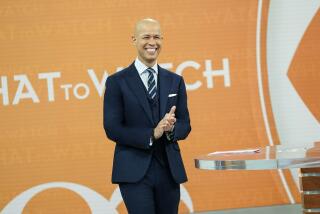Anchors Away : What Lures Canadians to U.S. Newsrooms?
- Share via
NEW YORK — Peter Mansbridge is a national hero in Canada. Not because he fought in a war or got the most runs batted in, but because he’s an anchorman who refused to come do the news in the United States.
Not that he wasn’t wooed a few years back, with much bigger bucks and a co-host job at “CBS This Morning.” CBS was convinced it had the network’s next star, and then-News President Howard Stringer flew to Canada to finalize the deal.
Mansbridge was heir apparent at the time to Canada’s top anchorman. While Stringer waited nearby, the Canadian Broadcasting Co. forced the old anchorman to step down, offered the top spot to Mansbridge--and got the prime minister to plead to his patriotism. Stringer went home stunned and empty-handed.
Mansbridge, it turned out, was simply the one that got away. While the country still has excellent TV journalists, it has watched one after another leave for jobs across the border, and today there are more Canadians giving Americans their news than could ever be expected.
Starting at the top, there’s the current ratings winner, Peter Jennings of ABC’s “World News Tonight.” There’s Morley Safer of the phenomenally successful “60 Minutes,” and Robert MacNeil of PBS’ deliciously stolid “Mac Neil/Lehrer NewsHour.”
Three network stars made during the Persian Gulf crisis were all Canadians: Arthur Kent, the so-called Scud stud, from NBC; Bob McKeown, the man who liberated Kuwait just before the troops, from CBS; and Sheila McVicar from ABC, an intelligent reporter already generating much interest at the competing networks.
Also currently strewn across American broadcasting companies: Alan Pizzey, John Blackstone and Mark Phillips of CBS; Barrie Dunsmore, Hilary Bowker, John McKenzie and Jerry King at ABC News; and Henry Champ and Keith Morrison at NBC News, the latter well known in Los Angeles, where he also co-anchors KNBC Channel 4’s 6 p.m. newscasts.
Morrison isn’t the only Canadian working at the local level. KGO-TV, the ABC affiliate in San Francisco, hired a Canadian, Robert Brown, to anchor its newscast earlier this year. And Chicago’s CBS affiliate, WBBM, has received both ratings and raves for its co-anchor Linda MacLennan, who was previously considered the Jane Pauley of Canada.
So why the great Canadian news raid?
* First, the talent comes extremely well trained. “By the time most of us have been in news in Canada a few years,” says Barrie Dunsmore, “we’ve already had to do some editing, producing and we’ve likely been on the air in a lot of different ways.” Or as Johnathan Rodgers, president of the CBS television stations division, says: “There’s a world of difference between most local reporters here and a national reporter in Canada in terms of their breadth of experience.”
* Aside from their experience, the Canadians are appealing to American networks for another reason: They’re affordable. To get a hot prospect off a successful local American station now, one has to pay a great deal to match what they’re making. (Local anchors in top American markets make well into the hundreds of thousands. Only very well-known network reporters reach the $200,000 mark, and Canadian reporters earn less than that.)
* The Canadian Broadcasting Co., or CBC, is the home for most of the country’s TV journalists, and it has been undergoing budget troubles that make CBS’ look fanciful. Some 1,100 employees have been laid off, and stations are closing around the country. “We’re feeling the softening of advertising revenue mixed with our government’s deficit and dwindling support,” says David Bazay, executive producer of the country’s national newscast. As a result, a lot of journalists are looking for work.
* Finally, there is the lure of the United States. Canadians are loyal to their own country but ambition is taking more and more away to the promised land of American network television. “Inevitably, you look toward the U.S.,” says Bob McKeown. “You’re talking about reaching 250 million instead of 25 million.” Adds Barrie Dunsmore: “If you’re growing up in Canada, whether you dream of reporting the news or playing hockey, the U.S. is the largest stage on which to play.”
There was always the occasional Canadian newscaster trickling over but nothing like the flood of recent years. Now the country next door is included on any talent list offered to network recruiters, station managers and agents looking for the next big catch.
“We have people that sit in Canadian hotel rooms watching TV,” says Don Fitzpatrick, who runs a company in San Francisco that evaluates news talent for stations and networks in this country. “We send them tapes to record the talent and they send it back. It’s a way of increasing our pool.” Fitzpatrick currently has about 12,000 people on tape with about 1,500 from Canada.
When CBS executive Rodgers was general manager of WBBM in Chicago, he saw such a tape of Linda MacLennan several years ago and flew to Canada to see more. She was co-hosting a news talk show and Rodgers was looking for someone to co-anchor a newscast that was interview-based.
Rodgers now runs all of CBS’ owned-and-operated stations. “We treat Canada as just another market,” he says. “We use search firms like Fitzpatrick’s and, of course, agents are coming to us with Canadian clients.”
One such agent is Art Kaminsky, who got Bob McKeown (then co-host of a “60 Minutes”-type Canadian show) his job at CBS. He also placed Mark Jones, a Canadian sportscaster, at ABC and ESPN.
“I should be scouring Canada because there’s so much talent there,” says Kaminsky, who adds that for years he didn’t because of some resistance to Americans getting their news from people who said “bean” instead of “been.”
“There was initially some fear about their accents,” Kaminsky says. “After all, there’s never been a successful British journalist on American TV, with the exception of David Frost, if you can call him that. The theory was any kind of accent sounded too sophisticated. But I think that’s been well overcome.”
Peter Jennings’ popularity has done a lot to erase any resistance; now Canadian newscasters seem to blend in quietly--which is often the strategy, particularly in a local market where there might be more skepticism about a “foreigner” delivering the news.
WBBM got past that by gradually bringing MacLennan to the fore. “We put her on with people who were well known in, and knew, the market,” says Rodgers. “And before we made her a real co-anchor, we sent her out in the field to report all kinds of stories.”
Keith Morrison admits he worried quite a bit about whether Southern Californians would accept the news coming from a Canadian. “I was advised, however, that (local) anchors in this country move around a lot,” he says. “I really thought this would end up being a sabbatical for a year or two.” So far, his sabbatical has lasted 5 1/2 years.
Like his compatriots, Morrison had done all sorts of journalism jobs in Canada, which made him much more than a pretty face and a great voice to NBC and KNBC. It’s just that unique diversity, for a good price, that appeals to those in places that matter.
“What I like about the Canadians,” says agent Kaminsky, “is they’re enormously well trained and therefore easy to sell. They come in with a level of competence and professionalism we just don’t see in local U.S. television.”
Morley Safer, one of the first biggies to make the move, agrees. “We worked there under tough rules and constant pressure on accuracy and fairness. It’s a good, hard school.”
Jennings says that Canada teaches its TV journalists better, and that American networks are coming to rely on them more and more. “The CBC, in particular, has always felt a mandate to train young people in the ways of broadcast journalism,” says Jennings. “Affiliate TV here has never been a place to take that as its responsibility. The Canadian broadcast journalists have consequently become the farm teams, especially when it comes to foreign correspondents.”
The CBC says one reason its TV journalists get such great experience is there’s so much time to fill: at least an hour a day of public affairs, coming in your choice of documentaries, interview shows and news magazines. But the institution isn’t so happy that it does all the work and someone else gets to reap the final rewards.
“The Americans find our people attractive,” says the CBC’s Bazay, “then they cash in on it. I think it’s frustrating. With our really good ones, I know it’s only a couple of years before the networks will be after them.”
Another reason for their excellent reputation, once they hit this country, is the rather cool, totally objective perspective Canadians bring to reporting, particularly on international stories.
Morley Safer first made his name in America covering the Vietnam War and he credits some of that to his background and perspective. “I think as a Canadian, I take a broader, less parochial view of things, and that no doubt served me in Vietnam. Because Canada is a small country, we sort of have to think internationally. We’re less obsessed with internal domestic matters.”
Jennings also covered foreign news for ABC for years and believes his Canadian background served him well. “I think as Canadians we are less susceptible to the government’s point of view and we are of the belief that there are other capitals that are important to a story as well. I think we have a less frenzied view of the world.”
Keith Morrison says he wasn’t necessarily looking for a U.S. job until a Los Angeles agent gave him a call. At the time, he was part of a “Nightline”-like current affairs program called “The Journal.” Morrison said he couldn’t refuse. “Ultimately, it was the challenge of being able to succeed in the big time. Of course, the money was better too.”
“America is so big, so tantalizing,” says Jennings, who, nevertheless, turned down ABC in 1964 because he didn’t believe he’d had quite enough experience. “Finally, what America offered was money to be able to send us off to all the corners of the world, which is the natural predilection of Canadians.”
The word you hear constantly from the Canadian newscasters is resources.
“It’s great to work for an organization that has this kind of money, resources and depth of talent,” says London-based Sheila McVicar. “The CBC had to do everything on the cheap.” McVicar turned down ABC a few years back but finally said yes last year to become a foreign correspondent.
Arthur Kent, who’s based in Rome, also says his dream of being a foreign correspondent necessarily led him to an American network.
The potential losers here, of course are the Canadian networks. Bazay tries to urge his people not to go until they can enter America at a high level.
Jennings has another concern. He worries that the hovering agents and American surveyors might cut short the Canadian journalists’ essential training period--that their curiosity, expertise and judgment may get clouded by the stars in their eyes. “It carries the risk,” he says, “of giving the younger ones a sense of importance rather than awe. I came with a real sense of awe and only when I knew I was really ready.”
More to Read
The biggest entertainment stories
Get our big stories about Hollywood, film, television, music, arts, culture and more right in your inbox as soon as they publish.
You may occasionally receive promotional content from the Los Angeles Times.










